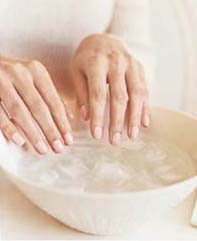HEALTHWhy Do Fingers Wrinkle Or ‘Prune’ In Water?
When exposed to water for an extended period of time, our fingers and toes will wrinkle or ‘prune’ up. A short while out of the water and they’re back to normal again. Today we’re going to explore why this happens.
Blame The Dead Cells
Most scientists believe the reason our fingers shrivel up in water is thanks to a thick layer of dead keratin cells which is the outer (top) layer of your skin. This outer layer of the skin is called the ‘epidermis’ and the inner layer is called the ‘dermis’. These two layers of your skin work together to cause the wrinkling.
And The Oil
fingers in waterCoating the dead keratin is an oily protein based substance called sebum. When your skin is in contact with water for a short period of time, this oil on your fingers and toes will eventually be washed off and cannot replenish until the exposure to water has ceased. When the oil is gone and the water comes into contact with the dead keratin cells, the cells absorb the water like a sponge which causes the skin to swell up.
Since there is no clear separation of space between the outer epidermis and inner dermis layers, the now swollen outer layer of your skin will appear to have been dragged back. Because the inner layer is not connected evenly or ‘uniformly’ to the outer layer, the difference in levels or ‘ridges’ causes the tugging to be uneven like a bunched up skirt. This gives us the distinctive ‘wrinkled fingertips’ we all know from spending time in a bath, pool or washing dishes.
Why Doesn’t The Rest Of My Body Wrinkle In The Water?
It’s actually pretty simple. Both the outer epidermis and inner dermis layers on your fingers and toes are much thicker and contain much more dead keratin cells than the skin on your chest or arms. Because of the increased thickness, the skin on your fingers and toes can absorb a lot more water which produces the effect. Careful though, waterlogged skin without the protective oil coating is more susceptible to cuts, damage and chapping.
Bonus Fact: Soaking in a pool or tub will hydrate your skin, but only for a short time. The added water will quickly evaporate and leave your skin dryer than it was before. The sebum or ‘oil’ that could hold the moisture in has been stripped off by the water. To prevent this, bath oils or certain types of lotions can be applied before the skin has dried which will allow you to retain the moisture for softer, healthier skin.
